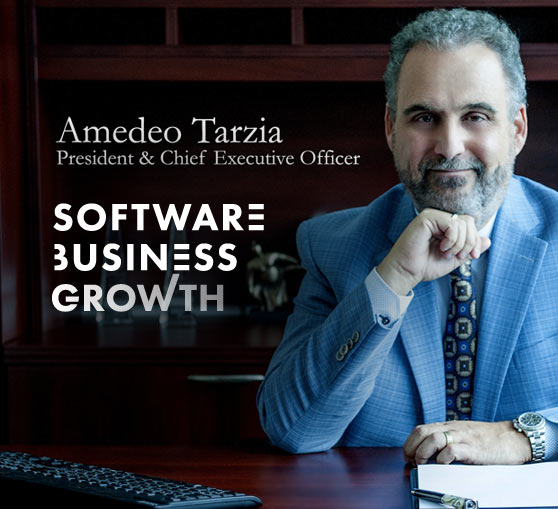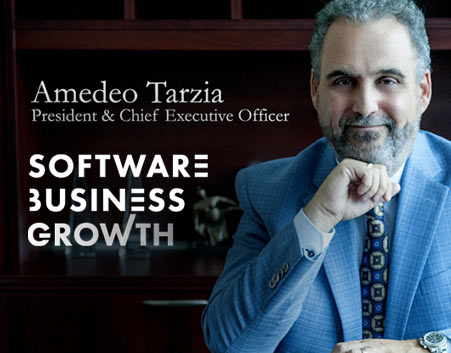SOFTWARE BUSINESS GROWTH - Channel Strategy: More Than Just Your Products

To read more on Amedeo Tarzia's thoughts on how to build an effective channel strategy please visit: www.softwarebusinessgrowth.com
The sale of software products often happens through a channel of resellers.
Selling through a channel of resellers, especially resellers that may be larger than you or associated with a major brand, can give your company the scale and your products the credibility that you otherwise could not. Furthermore, it can provide resellers with expertise in certain vertical markets and local expertise outside of your home market. The benefits of a channel relationship to a software vendor are many, but few stop to think about the other side of this relationship. The question you should be asking yourself is, what’s in it for your channel partner? It must be about more than just the “privilege” of selling your software products. In fact, every time I have ever spoken to a software company that has told me they’ve had a failed or failing channel strategy, in the end, it’s usually a failing of the software company not fully understanding its channel partners needs.
Is Your Business Ready For A Channel Strategy?
If your own house isn’t in order, its going to be difficult to help someone else with theirs. Do sales flow easily through your organization? Is your customer onboarding process well documented and understood and is it working? How about ongoing support/customer care? Do customers have quick access to a live agent? Do you have a system in place for tracking customer support tickets? Is it working for your customers? Do you have self help materials (Online Manuals, Videos, Info Blogs) available? What about your post onboarding customer outreach? Do you currently track all of your sales opportunities in a CRM system? Is it kept up to date with recent activities and does it provide an accurate sales funnel? If any of these processes aren’t working well, then adding channel partners is probably premature. You would be better off fixing your internal processes first. Furthermore, if you’ve already started bringing resellers on board and you are experiencing some of the issues mentioned above, then it’s better to pause bringing on additional resellers and focus on fixing your internal processes first. Otherwise, you’ll be one of those software companies talking about your failed channel strategy.
Channel Partners, What’s Involved?
OK, so you’re running internally like a swiss watch and you’re ready for a channel strategy. The first thing you should consider is a well written partner agreement. Of course, you don’t need one when things are going well, but when it hits the fan, it’s the first thing to get dusted off. Spend the money to have a competent lawyer draft one specifically for you, that protects your interests while still being fair to your partners. Secondly, consider a dedicated Channel Sales Manager to support your channel. The CSM will be responsible for onboarding new channel partners and supporting existing ones. If you’ve decided to continue to sell directly as well as through a Channel, then you need to ensure that in order to avoid conflicts, your CSM only deals with partners and has no part in direct sales. More on this later. Finally, you need to consider how you will support your channel. By support, I don’t mean tech support, which you are likely very good at, but rather from a sales and marketing perspective. Sure, it’s all in your head, but you need a method of knowledge transfer whereby your channel partners can effectively pitch your products. Many software companies sell by effectively demoing their software and pitching their unique value proposition. Do you have this well documented? Keep in mind that when selling through a channel, you are likely removed from the initial sales pitch at very least and many times, removed from the entire sales process. Documenting your company’s value proposition and how it applies to various industries, which you and your team can rhyme off without hesitation, is essential. One effective way to do this is through the use of industry “Battle Cards”. Each card highlights your specific value proposition or “pitch” for a particular industry and outlines the problem your solution solves. The channel partner simply needs to pull the battle card that represents the meeting they have and they should be better prepared to pitch your value and not just your product. Other materials you will want to have to support this effort are spec sheets (possibly white labeled), presentation materials and pre-recorded product demo videos. This will assist channel partners as they come up to speed on your products and give them the best chance of pitching your product as you would.
Channel Conflicts Anyone?
Channel conflicts are unfortunately an inherent part of a channel program. As your channel grows, there will be more and more likelihood that two or more partners will be chasing the same opportunity with your products. You need to come up with a strategy for dealing with this. One effective method is to have a deal registry system and to back the first in. Although you can’t stop other channel partners from bidding on an opportunity, they won’t receive any special pricing or direct support for the opportunity in question. This sounds simple enough, but its not perfect. Sometimes a less capable partner will register an opportunity with a large prospective customer, only to have one of your most capable partners try to register a day later. At that point the partner you want to back was simply late to the game and now you’re committed to supporting a partner with a significantly lower chance of winning the deal. It is important that you stick by your policy however, as a broken channel conflict policy is worse than no policy at all.
Another possible point of conflict with partners can arise if you’ve made the decision to continue selling your product directly. What happens if it turns out that you are the conflict? Will you back away from a potentially large opportunity in support of your channel partner? If not, you’re probably not going to have that partner for long.

To read more on Amedeo Tarzia's thoughts on how to build an effective channel strategy please visit: https://www.softwarebusinessgrowth.com/doc/channel-strategy-more-than-just-your-products-0001
Not All Channel Partners Are Created Equally
When signing on new channel partners you will need to remember that this is one place that the Pareto Principle, sometimes known as the 80/20 rule, definitely applies. Roughly 80 percent of your business will inevitably come from 20 percent of your channel partners. Some prospective channel partners will stumble upon an opportunity and will want to sign on as channel partners just for this one deal. They will have no intention of pursuing a market for your product, unless another falls in their lap. These partners will typically leave all the support and customer care up to you, after the initial sale, as the initial sale was their only objective. Others will make your product a fundamental part of their business and will have staff appropriately trained on effectively supporting your products. They will further invest in marketing it accordingly. It is important to determine early on what type of channel partners you want. Are you open to all comers in pursuit of any opportunity or will you be more selective in ensuring those you bring on will receive proper training and will agree to market your products?
It’s Worth All The Effort
Having an effective channel strategy with all of the challenges that go along with it, may seem like more work than it’s worth. But when you commit to putting the time in to properly support your channel partners, it can elevate your business tremendously. But like most other things in business and life in general, you will only get out of it what you are prepared to put in.
About The Author
Amedeo is a 30 year entrepreneur in the vast and dynamic Information Technology sector. He founded his first technology company in 1985, a company which still thrives today and has seeded several spin-off technology ventures. He is known as a “value investor” who has a keen eye for driving inorganic growth through the acquisition of underfunded and sometimes poorly managed, yet intensely innovative technology companies. As such, he has successfully completed numerous technology acquisitions, resulting in several technology spin-offs of his parent companies. He has also been on the other side of the fence in leading the acquisition of two of his own R&D companies, one to a major UK based software giant and the other to a US based Capital Investment Company. With an intense focus on “technology for the sake of business”, he drives innovation in technology that is broadly applicable to today’s businesses, resulting in rapid growth and profitability. He constantly reminds that “It’s not just about building it; we ultimately have to be able to sell it”. He is a strong believer that a company is ultimately only as strong as the people that drive its day to day operations and he thoroughly enjoys working with talented people who share in his passion for innovation in technology.
To read more on Amedeo Tarzia's thoughts on how to build an effective channel strategy please visit: https://www.softwarebusinessgrowth.com/doc/channel-strategy-more-than-just-your-products-0001


